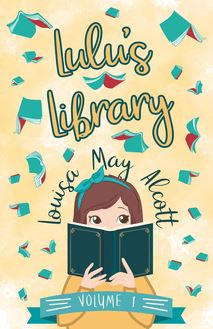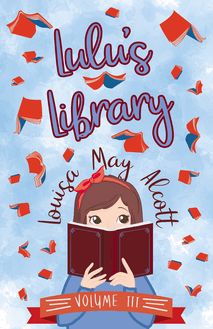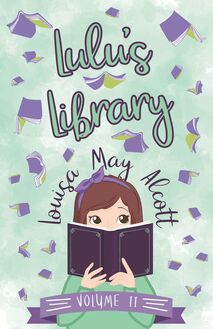-
 Univers
Univers
-
 Ebooks
Ebooks
-
 Livres audio
Livres audio
-
 Presse
Presse
-
 Podcasts
Podcasts
-
 BD
BD
-
 Documents
Documents
-
- Cours
- Révisions
- Ressources pédagogiques
- Sciences de l’éducation
- Manuels scolaires
- Langues
- Travaux de classe
- Annales de BEP
- Etudes supérieures
- Maternelle et primaire
- Fiches de lecture
- Orientation scolaire
- Méthodologie
- Corrigés de devoir
- Annales d’examens et concours
- Annales du bac
- Annales du brevet
- Rapports de stage
La lecture à portée de main
Vous pourrez modifier la taille du texte de cet ouvrage
Découvre YouScribe en t'inscrivant gratuitement
Je m'inscrisDécouvre YouScribe en t'inscrivant gratuitement
Je m'inscrisEn savoir plus
Vous pourrez modifier la taille du texte de cet ouvrage
En savoir plus

Description
Sujets
Informations
| Publié par | Read Books Ltd. |
| Date de parution | 11 octobre 2019 |
| Nombre de lectures | 0 |
| EAN13 | 9781528788595 |
| Langue | English |
| Poids de l'ouvrage | 1 Mo |
Informations légales : prix de location à la page 0,0500€. Cette information est donnée uniquement à titre indicatif conformément à la législation en vigueur.
Extrait
LULU'S LIBRARY
VOLUME II
By
LOUISA MAY ALCOTT
First published in 1887
This edition published by Read Books Ltd. Copyright © 2019 Read Books Ltd. This book is copyright and may not be
reproduced or copied in any way without
the express permission of the publisher in writing
British Library Cataloguing-in-Publication Data
A catalogue record for this book is available from the British Library
TO ELLEN T. EMERSON, ONE OF THE GOOD FAIRIES WHO STILL REMAIN TO US, BELOVED BY POETS, LITTLE CHILDREN, AND MANY GRATEFUL HEARTS, This Book IS AFFECTIONATELY INSCRIBED BY HER OLD FRIEND, L. M. ALCOTT. June, 1887.
Contents
Louisa M ay Alcott
PREFACE.
THE FROST KING AND HOW THE FAIRIES CONQU ERED HIM.
LILYBELL AND THISTLEDOWN, OR THE FAIRY SLEEPIN G BEAUTY.
RIPPLE, THE WATE R SPRITE.
EVA'S VISIT TO F AIRYLAND.
SUNSHINE, AND HER BROTHERS AND SISTERS.
THE FAIR Y SPRING.
QUE EN ASTER.
THE BROWNIE AND THE PRINCESS.
MERMAIDS.
LI TTLE BUD.
THE FLOWER 'S STORY.
Louisa May Alcott
Louisa May Alcott was an American Novelist, best known for the classic Little Women (1868) and its sequels Little Men and Jo’s Boys. Alcott was born on 29 November, 1832 in Germantown, Pennsylvania, USA, and was raised by her transcendentalist parents. The family, despite their connections with the American intellectual elite, suffered severe financial hardship and Alcott frequently helped to support the household. In 1840, after several financial setbacks, most notably following the experimental school set up by Louisa May’s father, the family moved to a cottage along the Sudbury River in Massachusetts. In 1843, the family moved again to the Utopian Fruitlands Community , an agrarian commune, dedicated to natural living. They finally settled in a house they named Hillside in As a result of this peripatetic childhood, Alcott’s schooling was mainly received from her father, who was an incredibly strict disciplinarian, high thinker and advocate of plain living. This instilled a determination and strong work ethic in Alcott, who worked as a teacher, governess, seamstress and writer in her early years. As an adult, Alcott was a strong abolitionist and a feminist advocate, becoming the first woman to register to vote in Concord, in a school board election. During the civil war, Alcott worked as a nurse in the Union Hospital at Georgetown, D.C. She collected all her letters, often dryly humorous, in book entitled Hospital Sketches (1863); a work which brought Alcott critical acclaim. Following on from this success, Alcott wrote several novels under the pen name A. L. Barnard, most notably A Long Fatal Love Chase (1866) and A Modern Mephistopheles (1875). However, Little Women and its sequels were Alcott’s major successes; the first book dealt with the childhood of Meg, Jo, Beth and Amy; characters strongly based on Alcott’s childhood accompanied by her own three sisters. The sequel, Good Wives (1869) dealt with their progression into adulthood, whilst Little Men (1871) detailed Jo’s life at the school she founded alongside her husband. Jo’s Boys (1886) completed the ‘Family Saga’. The Character Jo was loosely based on Alcott’s own life, however unlike the heroine, Alcott never married, commenting that ‘I am more than half-persuaded that I am a man's soul put by some freak of nature into a woman's body ... because I have fallen in love with so many pretty girls and never once the least bit with any man.’ Alcott was firmly part of the Gilded Age , along with authors such as Elizabeth Stoddard and Rebecca Harding Davis, she addressed women’s issues in a modern and candid manner. Alcott continued to write until her death on 6 March, The cause of death is uncertain; she suffered chronic health problems, including vertigo and typhoid, the latter of which was treated with mercury. However recent analysis of her illnesses has suggested an autoimmune disease such as Lupus. She is buried in Sleepy Hollow Cemetery, Concord, Massachusetts, on a hillside known as Author ’s Ridge.
PREFACE.
Most of these stories were written at sixteen for my younger sisters and their playmates, the little Emersons and Channings, and appeared some years later under the name of "Flower Fables." With some additions they are now republished for the amusement of those children's children by their ol d friend,
L. M . ALCOTT. Jun e, 1887.
Instead of dying in her cell, the fairy had made i t beautiful.
CHAPTER I.
THE FROST KING AND HOW THE FAIRIES CONQUERED HIM.
The Queen sat upon her throne, and all the fairies from the four kingdoms were gathered for a grand council. A very important question was to be decided, and the bravest, wisest elves were met to see what could be done. The Frost King made war upon the flowers; and it was a great grief to Queen Blossom and her subjects to see their darlings die year after year, instead of enjoying one long summer, as they might have done but for him. She had sent messengers with splendid gifts, and had begged him to stop this dreadful war, which made autumn so sad and left the fields strewn with dead flowers. But he sent back the gifts, sternly refused her prayers, and went on with his cruel work; because he was a tyrant, and loved to destroy innocen t things.
"My subjects, we will try once more," said the Queen, "if any one can propose a plan that will touch his hard heart and make him kind to the dear flowers."
Then there was a great rustling of wings and murmuring of voices; for all the elves were much excited, and each wanted to propose something. The Queen listened, but none of the plans seemed wise, and she was sadly perplexed, when her favorite maid of honor, the lovely Star, came and knelt before her, saying, while her face shone and her voice trembled with the earnestness of her words, "Dear Queen, let me go alone to the Frost King and try what love will do. We have sent presents and prayers by messengers who feared and hated him, and he would not receive them; but we have not tried to make him love us, nor shown him how beautiful his land might be, by patiently changing that dreary place, and teaching his people to plant flowers, not to kill them. I am not afraid; let me go and try my plan, for love is very powerful, and I know he has a heart if we can only find it."
"You may go, dear Star," answered the Queen, "and see if you can conquer him. But if any harm happens to you, we will come with our whole army and fight this cruel King till he is co nquered."
At these brave words all the elves cheered, and General Sun, the great warrior, waved his sword as if longing to go to battle at once. They gathered about Star,—some to praise and caress her, some to warn her of the dangers of her task, others to tell her the way, and every one to wish her success; for fairies are gentle little creatures, and believe heartily in the power of love.
Star wished to go at once; so they wrapped her in a warm cloak of down from a swan's breast, gave her a bag of the seeds of all their sweetest flowers, and with kisses and tears went to the gates of Fairyland to say good-by.
Smiling bravely she flew away toward the North, where the frost spirits lived. Soon the wind grew cold, the sunshine faded, and snow began to fall, making Star shiver under her soft cloak. Presently she saw the King's palace. Pillars of ice held up the roof fringed with icicles, which would have sparkled splendidly if there had been any sun. But all was dark and cold, and not a green leaf rustled, or bird sang in the wide plains, white with snow, that stretched as far as the eye could see. Before the doors stood the guard, frozen to their places, who lifted their sharp spears and let Star go in when she said she was a messenger from t he Queen.
Walls of ice carved with strange figures were round her, long icicles hung from the roof, and carpets of snow covered the floor. On a throne hung with gray mist sat the King; a crown of crystals was on his white hair, and his mantle was covered with silver frost-work. His eyes were cold, his face stern, and a smile never moved his hard lips. He frowned as he saw the fairy, and drew his cloak closer, as if afraid the light of her bright face might soften h is heart.
Then Star told her errand, and in her gentle voice begged him to be kind. She described the sorrow of both elves and children when his frost killed all the flowers; she painted a bright picture of a world where it was always summer, and asked him to let her show how lovely flowers made any spot, by planting some in his blea k fields.
But he only scowled and ordered her away, saying harshly, "I will do as I please; and if your Queen does not leave me in peace, I will go to war and freeze every fairy t o death."
Star tried to say more, but he was so angry that he called his people and bid them shut her up till she would own that he was right and promise to let him kill all the flowers he liked.
"I never will do that," said Star, as the Frost people led her away to a dark little cell, and left h er alone.
She was cold and tired and very sad because the King would not listen to her, but her heart was brave, and instead of crying she began to sing. Soon the light of her own eyes, that shone like stars, made a little glimmer in the dark, and she saw that the floor of her cell was of earth; and presently she heard the tinkle of water as it dripped drop by drop down from the snow above. Then she smiled, so that it seemed as if a ray of light had crept in.
"Here is earth and water, I will make the sunshine, and soon by my fairy power I will have a garden even in Frostland." As she spoke she pulled out the seeds and fell to work, still singing, still smiling, still sure that in time she would do the hard task she had set herself. Firs
-
 Univers
Univers
-
 Ebooks
Ebooks
-
 Livres audio
Livres audio
-
 Presse
Presse
-
 Podcasts
Podcasts
-
 BD
BD
-
 Documents
Documents
-
Jeunesse
-
Littérature
-
Ressources professionnelles
-
Santé et bien-être
-
Savoirs
-
Education
-
Loisirs et hobbies
-
Art, musique et cinéma
-
Actualité et débat de société
-
Jeunesse
-
Littérature
-
Ressources professionnelles
-
Santé et bien-être
-
Savoirs
-
Education
-
Loisirs et hobbies
-
Art, musique et cinéma
-
Actualité et débat de société
-
Actualités
-
Lifestyle
-
Presse jeunesse
-
Presse professionnelle
-
Pratique
-
Presse sportive
-
Presse internationale
-
Culture & Médias
-
Action et Aventures
-
Science-fiction et Fantasy
-
Société
-
Jeunesse
-
Littérature
-
Ressources professionnelles
-
Santé et bien-être
-
Savoirs
-
Education
-
Loisirs et hobbies
-
Art, musique et cinéma
-
Actualité et débat de société
- Cours
- Révisions
- Ressources pédagogiques
- Sciences de l’éducation
- Manuels scolaires
- Langues
- Travaux de classe
- Annales de BEP
- Etudes supérieures
- Maternelle et primaire
- Fiches de lecture
- Orientation scolaire
- Méthodologie
- Corrigés de devoir
- Annales d’examens et concours
- Annales du bac
- Annales du brevet
- Rapports de stage








